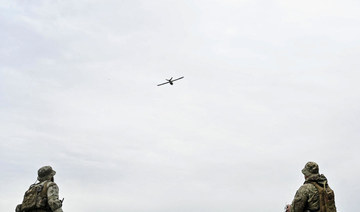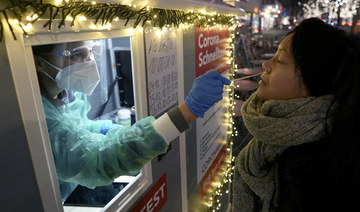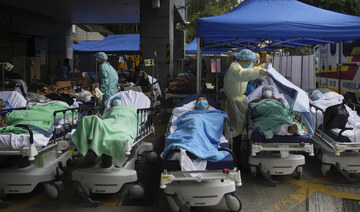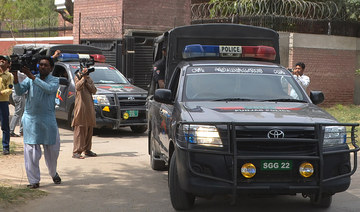TOKYO: Tokyo’s 2,848 COVID-19 infections on Tuesday were the Olympic host city’s highest since the pandemic began, officials said, as media reported that authorities had asked hospitals to prepare more beds for patients as the Delta variant drives the surge.
The rise in cases threatens to further erode support for Prime Minister Yoshihide Suga, whose ratings have slid to their lowest level since he took office last September, in large part because of his haphazard handling of the pandemic.
It also spells trouble for the Olympics, as many Japanese fear the influx of athletes and officials for the event could add to the surge. About 31 percent in a survey by the Nikkei daily on Monday said the Games should be canceled or postponed again.
“It’s the Delta variant,” said Kenji Shibuya, a former director of the Institute for Population Health at King’s College London, explaining the swift recent surge.
Shibuya added it was impossible to quantify to what extent the Olympics contributed to the surge but blamed the global sports showpiece as “one of the major driving forces.”
“The government has sent signals that people are supposed to stay home at the same time they celebrate the Games. It’s a totally inconsistent message,” said Shibuya, who is now running the vaccine roll-out in a town in northern Japan.
Japan has avoided the devastating outbreaks suffered by other nations such as India, Indonesia and the United States, but the fifth wave of the pandemic fueled by the Delta variant is piling pressure on Tokyo’s hospitals.
By Sunday, only 20.8 percent of the Japanese capital’s 12,635 COVID-19 patients had been able to obtain hospital treatment, government data showed. A government advisory panel says that if the ratio falls below the threshold of 25 percent, a state of emergency should be triggered.
In anticipation of the surge and considering the tough hospital situation, Tokyo has already declared a fourth state of emergency this month to run until after the Olympics.
In a last-minute change of heart, Japan also made the unprecedented decision to hold the Games, postponed from last year by the pandemic, without spectators to stem the spread of the virus.
As hospitals admit more patients, the city aims to boost the number of beds to 6,406 by early next month from 5,967 now, broadcaster TBS said.
Hospitals should look at pushing back planned surgery and scaling down other treatments, the broadcaster said, citing a notice to medical institutions from city authorities.
Health experts had warned that seasonal factors, increased mobility, and the spread of variants would lead to a rebound in COVID-19 cases this summer.
While vaccinations boost protection for the oldest citizens most likely to need emergency care, just 36 percent of the population has received at least one dose, a Reuters vaccination tracker shows.
The inoculation push has recently ebbed amid logistical snags after having picked up steam last month from a sluggish start.
Voter support for Suga slid nine points to 34 percent, its lowest since he took office last September, a July 23-25 Nikkei business daily survey showed on Monday.
Nearly two-thirds of respondents said the country’s rollout of coronavirus vaccinations was not going well.
Suga’s term as ruling Liberal Democratic Party (LDP) president expires in September and his LDP-led coalition faces an election for parliament’s powerful lower house, which must be held by November.
About a third in the Nikkei survey wanted the Games postponed again or canceled, while more than half said Japan’s border steps for incoming Olympics athletes and officials were “inappropriate.”
Despite tight quarantine rules for the Games, 155 cases have emerged involving athletes and others.
A strict “playbook” of rules to avoid contagion requires frequent virus testing, restricted movement and masks worn in most situations.
Olympic host Tokyo hits record 2,848 COVID-19 cases
Olympic host Tokyo hits record 2,848 COVID-19 cases
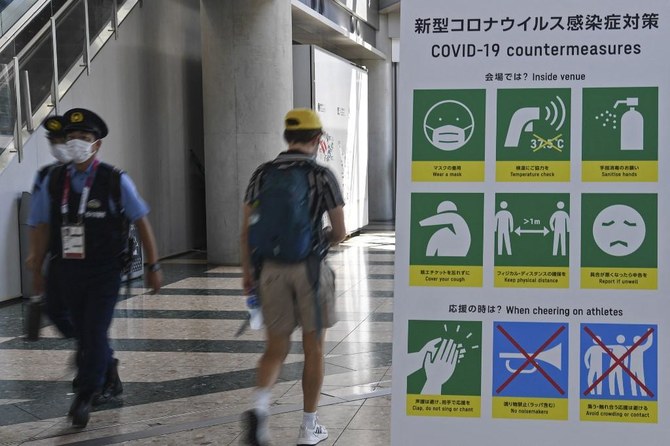
- The rise in cases threatens to further erode support for Prime Minister Yoshihide Suga
- It also spells trouble for the Olympics, as many Japanese fear the influx of athletes and officials for the event could add to the surge
Spain pledges €1bn in military aid to Kyiv

MADRID: Spain on Monday pledged one billion euros in military aid to Ukraine as Prime Minister Pedro Sanchez and Ukraine’s President Volodymyr Zelensky signed a security deal in Madrid.
The deal “includes a commitment for one billion euros in military aid for 2024,” Sanchez told a joint news conference
“It will allow Ukraine to boost its capabilities including its essential air defense systems to protect its civilians, cities and infrastructure which are still suffering indiscriminate attacks as seen this weekend in Kharkiv,” he said, referring to a Russian strike on the northeastern city that killed at least 16 people.
Zelensky’s visit comes as Ukraine has been battling a Russian ground offensive in the Kharkiv region which began on May 10 in Moscow’s biggest territorial advance in 18 months.
With the Russian assault now in its third year, Ukraine has been pleading for more weapons for its outgunned and outnumbered troops, notably seeking help to address its lack of air defense systems.
According to El Pais newspaper, the deal would include new Patriot missiles and Leopard tanks. Zelensky has already signed bilateral security agreements with several countries including France, Germany and the UK.
Sanchez said the security agreement would cover a range of a different issues.
“The agreement is based on a comprehensive overview of security and covers various areas such as military, humanitarian and financial support, as well as collaboration between Spanish and Ukrainian defense industries, as well as help with reconstruction and de-mining among other things,” he said.
Italy says violence against civilians in Gaza ‘no longer justifiable’

- Defense Minister Guido Crosett said ‘We are watching the situation with despair’
ROME: Italy said on Monday Israeli attacks on Palestinian civilians in Gaza were no longer justifiable in one of the strongest criticisms Rome has made so far against Israel’s campaign.
“There is an increasingly difficult situation, in which the Palestinian people are being squeezed without regard for the rights of innocent men, women and children who have nothing to do with Hamas and this can no longer be justified,” Defense Minister Guido Crosetto told SkyTG24 TV.
“We are watching the situation with despair.”
Crosetto said Italy agreed in principle with the Israeli response to the Oct. 7 assault by Hamas militants on southern Israeli communities, but he added that a difference had to be made between the militant group and the Palestinian people.
On Saturday, Italian Prime Minister Giorgia Meloni and Foreign Minister Antonio Tajani met Palestinian Prime Minister Mohammad Mustafa in Rome, reiterating their support for a ceasefire and urging Hamas to release Israeli hostages.
Italy has repeatedly said that Israel had a right to defend itself from Hamas. Last week, Rome said an International Criminal Court prosecutor’s decision to seek an arrest warrant for Israeli leaders was “unacceptable.”
British foreign ministry official says some Muslims in UK want to ‘challenge values’ of the country

- Was responding to comments made by right-wing politician Nigel Farage, the honorary president of Reform UK
LONDON: A British foreign office minister said on Monday some Muslims in the UK wanted to “challenge the values” of the country.
Anne-Marie Trevelyan’s was speaking after right-wing politician Nigel Farage, the honorary president of Reform UK, told Sky News on Sunday there was a growing proportion of British Muslims who “loathed” the UK’s values, citing a study that claimed 46 percent supported Hamas.
Trevelyan told LBC Radio on Monday that she believed a small minority of British Muslims matched the description.
“The vast proportion of British Muslims are wonderful, peace-loving, community-minded people, certainly in the northeast where I’m based, we have fantastic communities and they are a really important part of our social fabric,” she said.
“There are a very small proportion for whom they want to challenge those values that we hold dear in the UK, which are British values, and there we need to continue to work in community to bring those people to this.
“The UK has incredible values of freedom of speech, freedom of choice … these are incredibly important values, but they have to be nurtured and looked after, and where there are those who would threaten them we need to make sure that we deal with that,” she said.
Bridget Phillipson of the Labour Party, the shadow education secretary, slammed Farage’s comments as “incendiary rhetoric,” and told the same LBC show: “What we need in this election is a sense of how we bring our country together, how we focus on a more positive and hopeful mission for what our country can be — not this kind of division.”
WHO chief urges countries to quickly seal pandemic deal
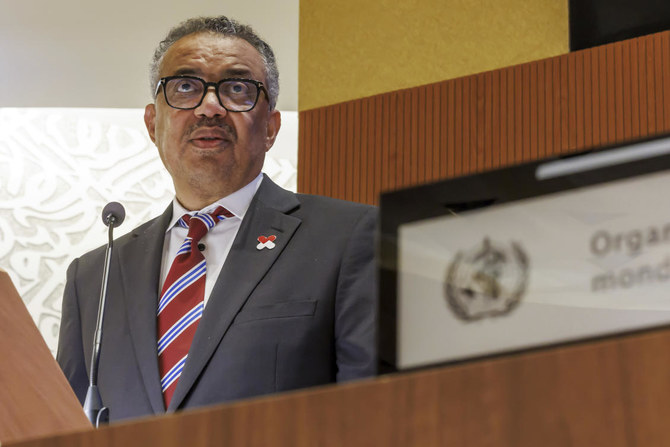
- Scarred by COVID-19, nations have spent two years trying to forge binding commitments on pandemic prevention, preparedness and response
GENEVA: The World Health Organization chief on Monday urged countries to nail down a landmark global agreement on handling of future pandemics after they missed a hard deadline.
Scarred by COVID-19 — which killed millions, shredded economies and crippled health systems — nations have spent two years trying to forge binding commitments on pandemic prevention, preparedness and response.
Negotiators failed to clinch a deal ahead of this week’s World Health Assembly — the annual gathering of WHO’s 194 member states — the deadline for concluding the talks.
WHO chief Tedros Adhanom Ghebreyesus opened the assembly Monday, saying he was confident that an agreement would be secured.
“Of course, we all wish that we had been able to reach a consensus on the agreement in time for this health assembly and crossed the finish line,” he said.
“But I remain confident that you still will, because where there is a will, there is a way.”
Tedros said the task before negotiators had been “immense, technically, legally, and politically,” and that they had been “operating on a very ambitious time line.”
“You have demonstrated a clear commitment to reaching an agreement,” he said, adding that negotiators had “worked long days and nights,” closing meetings as late as 4:00 a.m.
He hailed their dedication to push forward despite “a torrent of misinformation that was undermining your negotiations.”
While missing Friday’s deadline, countries have voiced a commitment to keep pushing for an accord.
Negotiators are due on Tuesday to present the outcome of the talks to the assembly, which runs until June 1, and the assembly will take stock and decide what to do next.
“I know that there remains among you a common will to get this done, so, there must always be a way,” Tedros said.
“Meaning the solution is in your hands,” he stressed.
Parallel talks have also taken place on revising the International Health Regulations, which were first adopted in 1969 and constitute the existing international legally binding framework for responding to public health emergencies around the world.
The proposed amendments to the IHR, including adding more nuance to a system meant to alert countries to potential health emergencies of global concern, might have a better chance of being adopted during this week’s assembly, observers said.
Latest deadly weather in US kills at least 18 as storms carve path of ruin across multiple states
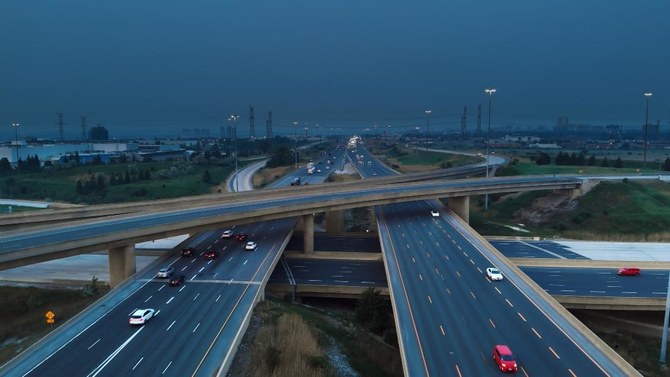
- The storms inflicted their worst damage in a region spanning from north of Dallas to the northwest corner of Arkansas
- In Texas, about 100 people were injured and more than 200 homes and structures destroyed
VALLEY VIEW, Texas: Powerful storms killed at least 18 people, injured hundreds and left a wide trail of destruction across Texas, Oklahoma and Arkansas after obliterating homes and destroying a truck stop where dozens sought shelter during the latest deadly weather to strike the central US
The storms inflicted their worst damage in a region spanning from north of Dallas to the northwest corner of Arkansas, and the system threatened to bring more violent weather to other parts of the Midwest. By Monday, forecasters said, the greatest risk would shift to the east, covering a broad swath of the country from Alabama to near New York City.
Kentucky Gov. Andy Beshear declared a state of emergency early Monday in a post on social media platform X, citing “multiple reports of wind damage and tornadoes.”
Seven deaths were reported in Cooke County, Texas, near the Oklahoma border, where a tornado Saturday night plowed through a rural area near a mobile home park, Texas Gov. Greg Abbott said at a news conference Sunday. The dead included two children, ages 2 and 5. Three family members were found dead in one home, according to the county sheriff.
Storms also killed two people and destroyed houses in Oklahoma, where the injured included guests at an outdoor wedding, eight people in Arkansas and one person in Kentucky. Tens of thousands of residents were without power across the region.
In Texas, about 100 people were injured and more than 200 homes and structures destroyed, Abbott said, sitting in front of a ravaged truck stop near the small agricultural community of Valley View. The area was among the hardest hit, with winds reaching an estimated 135 mph (217 kph), officials said.
“The hopes and dreams of Texas families and small businesses have literally been crushed by storm after storm,” said Abbott, whose state has seen successive bouts of severe weather, including storms that killed eight people in Houston earlier this month.
Abbot signed an amended severe weather disaster declaration on Sunday to include Denton, Montague, Cooke and Collin on a list of counties already under a disaster declaration sparked by storms and flooding in late April.
Hugo Parra, who lives in Farmers Branch, north of Dallas, said he rode out the storm with 40 to 50 people in the bathroom of the truck stop. The storm sheared the roof and walls off the building, mangling metal beams and leaving battered cars in the parking lot.
“A firefighter came to check on us and he said, ‘You’re very lucky,’” Parra said. “The best way to describe this is the wind tried to rip us out of the bathrooms.”
Multiple people were transported to hospitals by ambulance and helicopter in Denton County, also north of Dallas.
No more deaths are expected and nobody was reported missing in Texas, Abbott said, though responders were doing one more round of searches just in case.
Eight people died statewide in Arkansas, Gov. Sarah Huckabee Sanders confirmed in a news conference Sunday evening. An emergency official said two of the deaths were attributed to the circumstances of the storm but not directly caused by weather, including a person who suffered a heart attack and another who was deprived of oxygen due to a loss of electricity.
The deaths included a 26-year-old woman who was found dead outside a destroyed home in Olvey, a small community in Boone County, according to Daniel Bolen of the county’s emergency management office. One person died in Benton County, and two more bodies were found in Marion County, officials said.
In Oklahoma, two people died in Mayes County, east of Tulsa, officials said.
In Kentucky, a man was killed Sunday in Louisville when a tree fell on him, police said. Louisville Mayor Craig Greenburg confirmed on social media it was a storm-related death.
A deadly series of storms
The destruction continued a grim month of deadly severe weather in the nation’s midsection.
Tornadoes in Iowa last week left at least five people dead and dozens injured. The deadly twisters have spawned during a historically bad season for tornadoes, at a time when climate change contributes to the severity of storms around the world. April had the second-highest number of tornadoes on record in the country.
Meteorologists and authorities issued urgent warnings to seek cover as the storms marched across the region late Saturday and into Sunday. “If you are in the path of this storm take cover now!” the National Weather Service office in Norman, Oklahoma, posted on X.
Harold Brooks, a senior scientist at the National Severe Storms Laboratory in Norman, said a persistent pattern of warm, moist air is to blame for the string of tornadoes over the past two months.
Homes destroyed, roads blocked
Residents awoke Sunday to overturned cars and collapsed garages. Some residents could be seen pacing and assessing the damage. Nearby, neighbors sat on the foundation of a wrecked home.
In Valley View, near the truck stop, the storms ripped the roofs off homes and blew out windows. Clothing, insulation, bits of plastic and other pieces of debris were wrapped around miles of barbed wire fence line surrounding grazing land in the rural area.
Kevin Dorantes, 20, was in nearby Carrollton when he learned the tornado was bearing down on the Valley View neighborhood where he lived with his father and brother. He called the two of them and told them to take cover in the windowless bathroom, where they rode out the storm and survived unharmed.
As Dorantes wandered through the neighborhood of downed power lines and devastated houses, he came upon a family whose home was reduced to a pile of splintered rubble. A father and son were trapped under debris and friends and neighbors raced to get them out, Dorantes said.
“They were conscious but severely injured,” Dorantes said.
Widespread power outages
The severe weather knocked out power for tens of thousands of homes and businesses in the path of the storms.
On Monday, more than 187,000 customers were without power in Kentucky, according to the tracking website poweroutage.us. Some 84,000 customers were without power in Alabama; 74,000, West Virginia; 70,000, Missouri; and 63,000, Arkansas.
Inaccessible roads and downed power lines in Oklahoma also led officials in the town of Claremore, near Tulsa, to announce on social media that the city was “shut down” due to the damage.
More severe weather forecast
The system causing the latest severe weather was expected to move east over the rest of the holiday weekend.
The Indianapolis 500 started four hours late after a strong storm pushed into the area, forcing Indianapolis Motor Speedway officials to evacuate about 125,000 race fans.
More severe storms were predicted in Illinois, Missouri, Kentucky and Tennessee.
The risk of severe weather moves into North Carolina and Virginia on Monday, forecasters said.
To follow the progress of the storm system, see The Associated Press Tornado Tracker.




